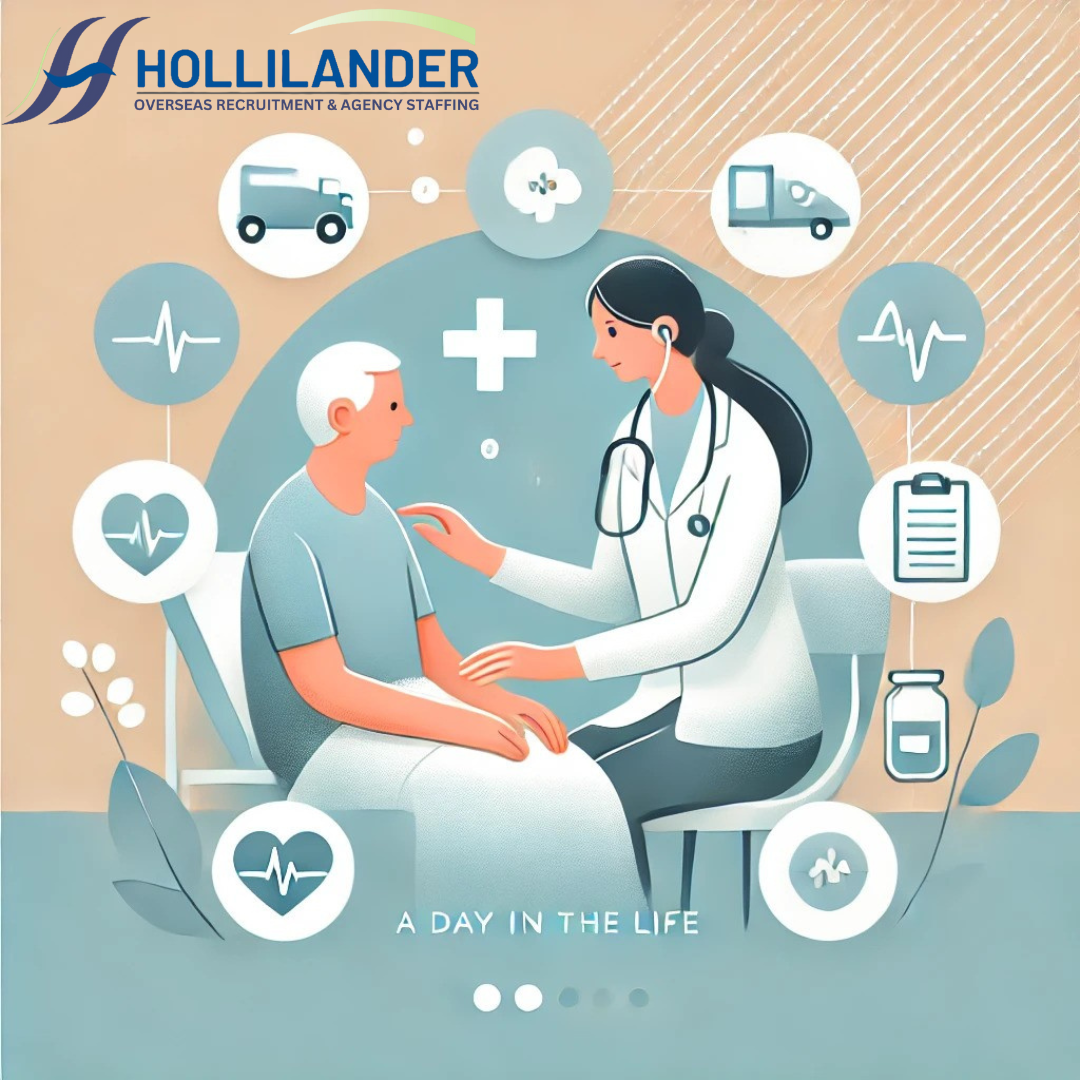Health care assistants, also referred to as nursing assistants or patient care assistants, are indispensable features in any health facility. They offer a variety of services to both the concerned medical personnel and the concerned patient. They play a significant role in trying to keep patients comfortable, cared for, and supported throughout their days either in the hospitals, clinics, or homes where they remain. This article provides a review of the regular activities which may be taken on by a Health Care Assistant during a normal shift.

Healthcare Assistants (HCAs) play a vital role in delivering high-quality patient care across hospitals, nursing homes, and care facilities. Their day is structured, demanding, and deeply rewarding. Below is a detailed look at the daily responsibilities of a Healthcare Assistant, from the start of the shift to handover.
Morning Routine: Preparing for the Day
Start of Shift and Patient Handover
A Healthcare Assistant begins their shift with a handover from the previous team. This ensures they are informed about:
-
Patient allocations
-
Current medical conditions
-
Updates to care plans
-
Specific tasks to be completed during the shift
Clear communication at this stage is essential for safe and effective patient care.
Equipment and Supplies Check
Before providing direct care, HCAs check that all medical equipment and supplies are available and functioning correctly, including:
-
Blood pressure monitors
-
Thermometers
-
Mobility aids
-
Gloves, cleaning products, and fresh linens
This preparation helps maintain hygiene standards and ensures smooth workflow.
Patient Care Responsibilities
Morning Personal Care
Morning hygiene is a key responsibility of HCAs, particularly for patients with limited mobility or those recovering from illness or surgery. Tasks include:
-
Bathing, showering, or bed washing
-
Assisting with oral hygiene, hair care, and dressing
-
Changing bed linen and maintaining a clean environment
These tasks improve patient comfort, dignity, and overall wellbeing.
Assisting With Mobility
Healthcare Assistants help patients move safely by:
-
Transferring patients from bed to chair
-
Supporting walking and rehabilitation exercises
-
Using specialist equipment such as hoists and walking aids
Mobility assistance reduces the risk of falls and supports patient independence.
Monitoring Vital Signs and Patient Health
Recording Vital Signs
HCAs regularly monitor and document vital signs, including:
-
Blood pressure
-
Pulse rate
-
Respiratory rate
-
Body temperature
These observations help track patient health and identify early signs of deterioration.
Observing and Reporting Changes
Because HCAs spend the most time with patients, they are often the first to notice changes such as:
-
Skin irritation or pressure sores
-
Signs of infection
-
Increased pain or discomfort
Any concerns are promptly reported to nurses or doctors for further assessment.
Mealtime Support and Hydration
Assisting With Meals
Healthcare Assistants help patients who require support with eating, ensuring they:
-
Receive the correct diet
-
Eat safely and comfortably
-
Maintain adequate nutrition
Monitoring Food and Fluid Intake
HCAs accurately record food and fluid intake to ensure patients remain hydrated and receive sufficient nourishment, which is vital for recovery and long-term health.
Emotional Support and Social Interaction
Providing Comfort and Companionship
HCAs offer essential emotional support, particularly to long-term or vulnerable patients. Simple actions such as conversation, reassurance, and kindness can significantly improve a patient’s mental wellbeing.
Supporting Families
Healthcare Assistants may also communicate with patients’ families, offering updates, reassurance, and guidance—especially during critical or end-of-life care situations.
Afternoon Duties: Ongoing Care and Documentation
Continued Patient Care
As the shift continues, HCAs:
-
Reposition patients to prevent pressure sores
-
Assist with toileting needs
-
Encourage safe mobility
Working With Medical Staff
HCAs work closely with nurses and doctors, assisting with:
-
Preparing patients for procedures
-
Collecting samples such as urine or stool
-
Supporting minor clinical tasks
Accurate Record Keeping
Detailed documentation is a critical part of the role. HCAs record:
-
Care provided
-
Observations made
-
Food and fluid intake
-
Any changes in patient condition
This ensures continuity of care and supports informed medical decision-making.
End of Shift: Evening Care and Handover
Preparing Patients for Bed
Evening duties include:
-
Assisting with hygiene and changing into nightwear
-
Ensuring patients are comfortable and safe
-
Maintaining a clean and calm environment
Handover to the Next Shift
Before finishing, HCAs provide a thorough handover to night staff, outlining:
-
Patient condition
-
Care delivered
-
Any concerns or follow-up required
Challenges and Rewards of Being a Healthcare Assistant
Challenges
-
Physically demanding work, including lifting and long hours on foot
-
Emotional challenges, particularly in palliative or critical care settings
Rewards
-
Making a meaningful difference in patients’ lives
-
Strong teamwork with nurses, doctors, and healthcare professionals
-
A deeply fulfilling and respected career
Why Healthcare Assistants Are Essential
The role of a Healthcare Assistant is varied, demanding, and incredibly important. From personal care and monitoring vital signs to offering emotional support, HCAs ensure patients receive the care, dignity, and compassion they deserve every day.
